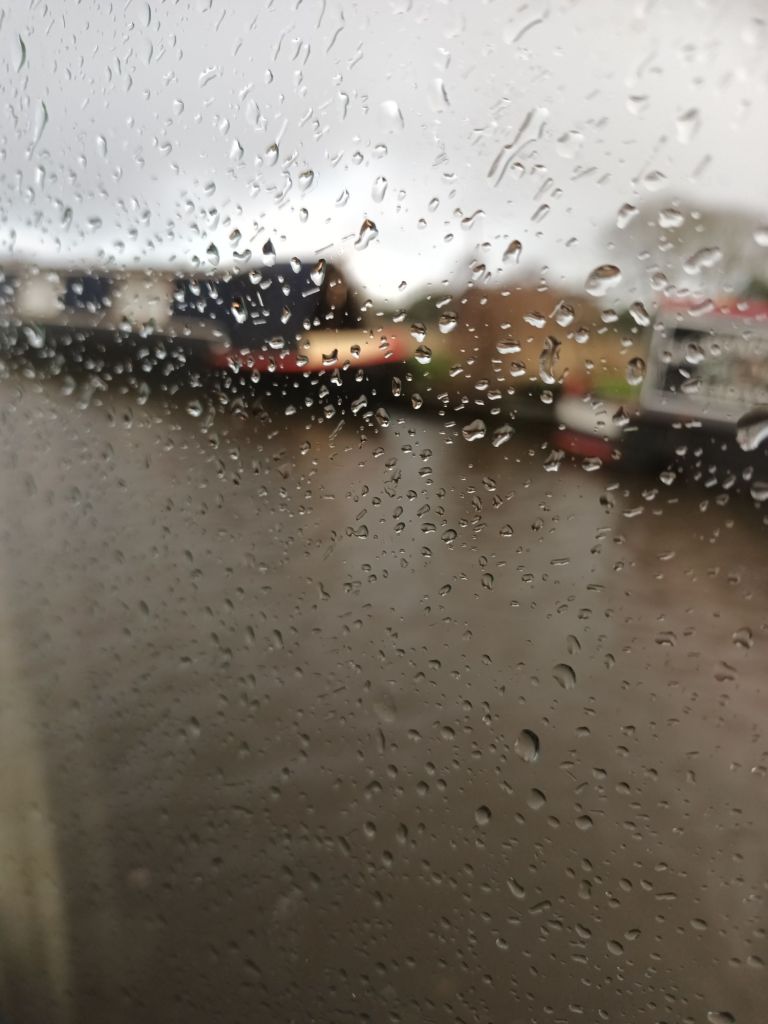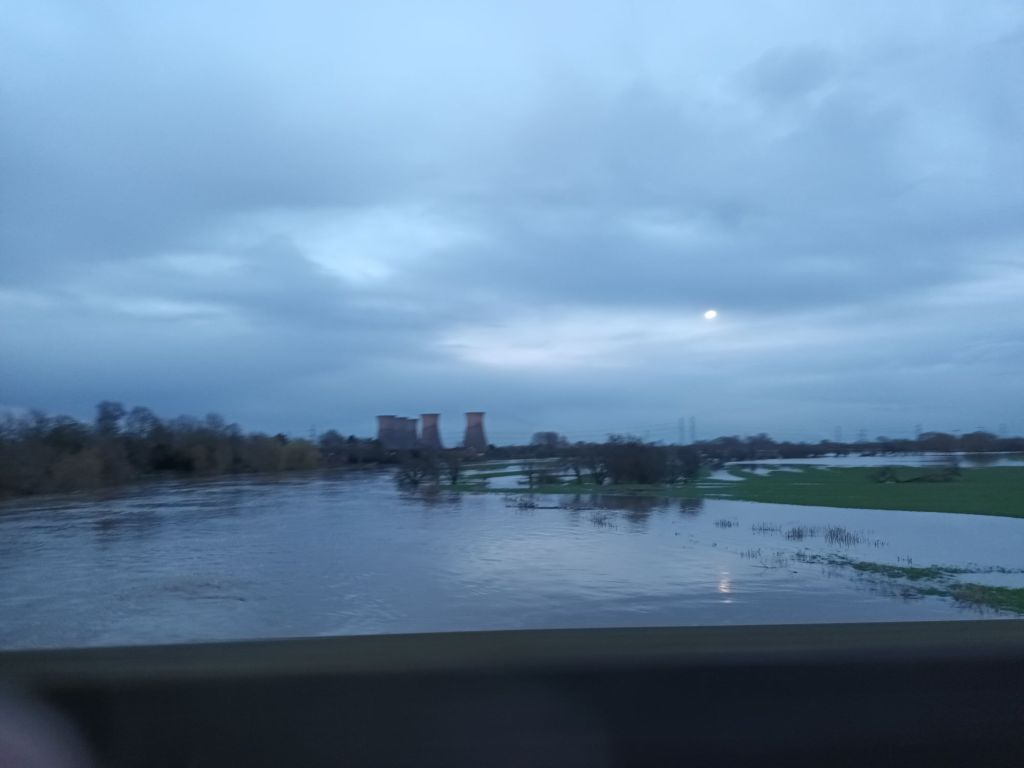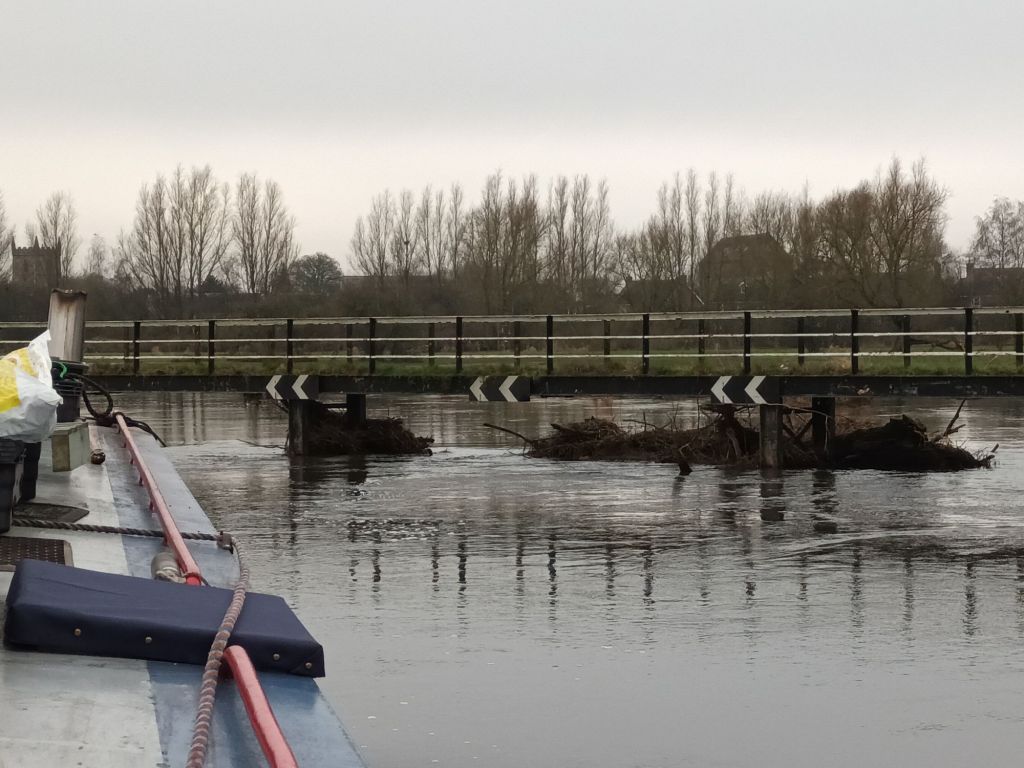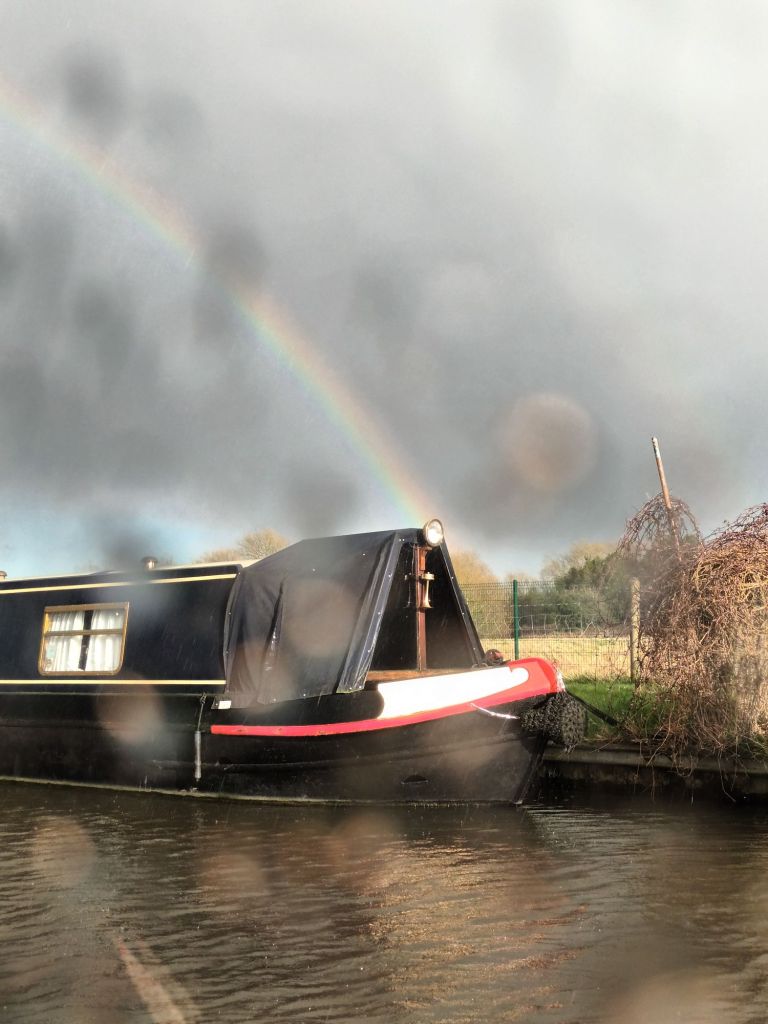The British and boaters are obsessed with the weather. It plays a major part in how we live, enjoy and in our case, move, our floating home and office.

Walking this morning as rain and sleet, hail and wind whipped my skin and Boatdog shivered beside me, I was in full agreement with the man who grumbled: “I’ve had enough of this now.” Haven’t we all, even if we accept Longfellow’s words that “into each life some rain must fall.”
The Midlands, where we’ve spent most of this first part of the year, has experienced one of its wettest Februarys ever. Rain is hammering silently against the lovely new double glazed windows that keep out the elements and their soundscape in ways their predecessors did not. Rain these days comes with consequences. Even a little bit of rain has implications.
Parts of the Midlands have had more than two and a half times the normal February rainfall this year, and that means the rivers are full, overflowing, flooding with alarming regularity. We’ve had 6 named storms this winter to date. Every drop that falls now lands on saturated ground. There is nowhere for more water to flow away, it sits, it floods.

For us, this has meant that our original plans to cruise the River Soar once more have had to be abandoned. On February 18, during a Sunday afternoon family walk, 2-year-old Xielo Maruziva slipped into the river at Aylestone Meadows and vanished from sight in seconds. His family continue to pray and hope he will be returned to them. The flooding river has also claimed boats this month.
The Soar normally flows into the Trent, but Trent has also spent much of the past month in flood, closed to navigation. One small section of the Trent is at Alrewas in Staffordshire. Boats moving up and down the Trent and Mersey Canal at that point have to travel on the river for 1 mile and 2 furlongs between the lock at Alrewas and a lock at Wychnor, passing a large weir en route. This section has been intermittently closed to navigation this year because the strong flows make it unsafe. As we headed from the Coventry Canal across to Derbyshire to Willington, where we had arranged to get our windows replaced, we were held up at Alrewas until the river section was passable. We got across, but last week, as soon as the windows were wonderfully replaced, we intended to come back across to begin our journey north. No chance said the Trent – I’m in charge ! Every time it rained, we held our breath because two or three days later, river levels would rise once more. We prayed for dry weather, and we’re grateful for several clear days that gave us hope.

On Monday morning last week the Trent and Mersey river section was regarded as navigable, so we set off with alacrity, and made a slow river crossing battling against the current, watching boaters including some old friends whizzing past us as they went rapidly with the flow.
For us, the rain brings mud, flooded towpaths, wet clothes, and a soggy dog. It is an opportunity to be grateful for our Morso stove, dry towels, efficient windows, and the chance to get warm and dry in our cosy boat. It has a short-lived effect on our bodies.
For others we have met these past weeks, the rain brings hours, days of struggle. They are resigned to being cold, wet, and stiff as the rain soaks them. Geoffrey and Jim have both been generous to share insight into their lives living outside. They don’t have boats or vans or tents. They carry their lives with them every day. We look at bridges and consider them for height and width, for their capacity to knock our chimney and aerial off (yes – the high water levels and a bridge put paid to our aerial cover this week). Geoffrey and Jim both look at bridges for their capacity to offer overnight shelter, evaluating their width, their positioning to withstand prevailing winds, the slope of the towpath beneath to repel or collect water. Misjudging one of those, or an unexpected change of direction of the wind, can lead to wet sleeping bags, soaking clothes, and literally of being damp. Geoffrey particularly looks at bridges for their safety, too – are they away from inebriated nighttime drinkers, so offering a night’s sleep away from potential disruption.
Thanks to Raynor Winn’s personal journey, The Salt Path, many of us recognise that there are as many reasons for homelessness as there are people. Geoffrey and Jim both live as they do because of the Covid pandemic, but there the similarity stops.
Geoffrey became homeless when the holiday park for which he worked had to close because of the pandemic. He and all the other staff lost their jobs, but for all who lived in as he did, they also lost their homes. The day after his 67th birthday, suddenly, with no work and no home, he was advised to talk to social services. They looked at him, noted he was suffering from the onset of Parkinson’s disease and told him he should be going into an old people’s home, many of whom were struggling to contain the spread of Covid. He was horrified and walked out of social services’ office, and as he put it, “I just kept walking.”
He talks eloquently about the wonderful people he’s met, particularly the generosity of boaters, as he migrated towards the towpath with its regular bridges and many benches. Over a welcome mug of tea and a hot sausage roll, he shared learned lessons about the goodness of strangers, the consideration he’s experienced, the joy of winter sun and the warmth of unexpected kind gestures. He’s been offered a holiday park job after Easter, so he hopes to be back with a roof over his head once more.

Jim, too, is living in villages alongside the canal. He is in his 40s and works as a casual labourer whenever he can. His marriage broke down during the pandemic, and he lost his job as well as his home. He lived in hostel accommodation but found himself stressed and alarmed by the behaviour of some others there. He chose to live as he has now done for over two and a half years, walking the towpaths, the footpaths, and country lanes. He stays in the West Midlands, the area of the country he knows best, and says he feels stronger, happier, and enjoys a uplifting sense of freedom, even in the rain.
These men have taught us much these past weeks – about gratitude, acceptance, values, and expectations. We are grateful to have met them and for them to have shared their time and lives with us. They both said they appreciated our proffered hot drinks and food, and conversations. As the wonderful late poet Benjamin Zephaniah rightly recognised, people need people. (Enjoy the rain in Phil Hankinson’s illustration). Zephaniah also says: “If you need a lesson From whom will you learn.” Geoffrey and Jim have taught us so much that’s positive these past weeks – about themselves but also about us and wider society too.
Our floating itinerant lifestyle is also a product of the Covid pandemic. It is a life infinitely more full of comfort than Geoffrey or Jim’s, and one for which we remain eternally grateful. We are grateful we could help them a little, that we got across the river when we did, and for the moments without rain. What are you grateful for today?
